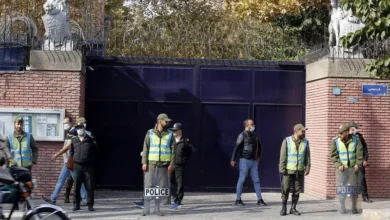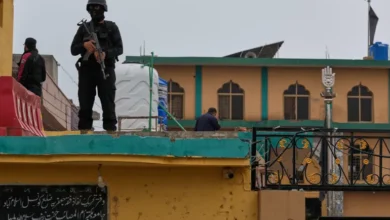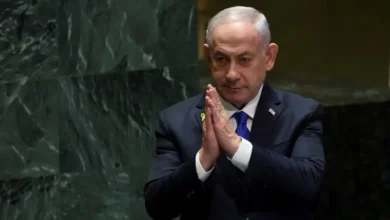Luis Montenegro claims victory for Portugal’s centre-right in snap polls

Luis Montenegro, the leader of Portugal’s opposition centre-right Democratic Alliance (AD) party, has claimed victory in the country’s snap general election after a close-run race against the incumbent Socialists.
Montenegro declared victory early on Monday morning, shortly after the Socialist Party (PS)’s leader Pedro Nuno Santos conceded defeat, but it was unclear whether he would be able to govern without the support of the far-right Chega party, with whom he again refused to negotiate.
The AD and its conservative allies in Madeira won at least 79 seats in the 230-seat parliament, ahead of the PS’s 77. Chega’s parliamentary representation more than quadrupled to at least 48 lawmakers, giving the combined right a majority.
Four seats remained to be attributed after the final count of ballots from abroad.
“It seems inescapable that the AD won the elections and that the Socialists lost,” Montenegro told excited supporters who had gathered in the capital, Lisbon. It was crucial for political parties in the new parliament to act responsibly and “comply with the wish of the Portuguese people”, he added.
Sunday’s snap election, triggered by Socialist Prime Minister Antonio Costa’s sudden resignation amid a corruption investigation, was marked by a surge in support for Chega, which positioned itself as an alternative to the two parties that have long dominated Portuguese politics, promising to crack down on corruption and expressing hostility to what it sees as “excessive” immigration.
Ricardo Baptista Leite, a former Portuguese member of Parliament, told Al Jazeera that while the final outcome was still not clear, “we are seeing an extreme rise [in the far right] that clearly has become the third dominating party” in Portugal’s political landscape.
“The other conclusion that seems very clear, is how the left has decreased tremendously,” he said. “The previous government led by Antonio Costa had a full majority in the 230-seat parliament. That means that he had more than 115 seats, while it seems that all of the left wing parties together may not go over 90 seats,” Leite added.
The election took place against a backdrop of low wages and a high cost of living – worsened last year by surges in inflation and interest rates – coupled with a housing crisis and failings in public healthcare.
Portugal is the latest country in Europe to shift towards the far right. The country returned to democracy 50 years ago after the fall of the fascist dictatorship of Antonio de Oliveira Salazar.










